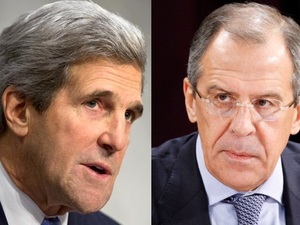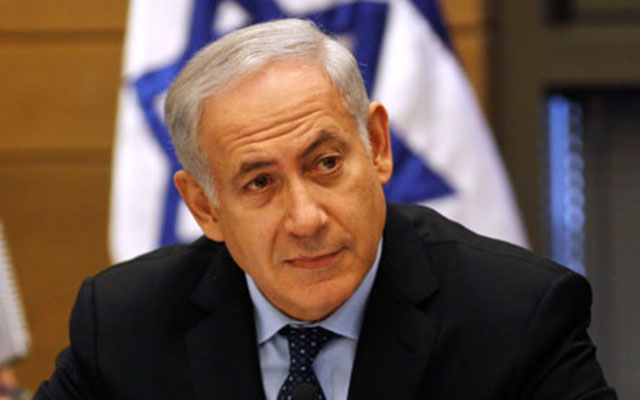US, Russia launch last-gasp diplomacy before Crimea vote

 LONDON – The US and Russia on Friday were set to launch a round of last-gasp diplomacy, two days before Crimea votes to secede from Ukraine in a referendum that has sparked the biggest East-West showdown since the Cold War.
LONDON – The US and Russia on Friday were set to launch a round of last-gasp diplomacy, two days before Crimea votes to secede from Ukraine in a referendum that has sparked the biggest East-West showdown since the Cold War.
US Secretary of State John Kerry was to sit down with Russian Foreign Minister Sergei Lavrov in London as bloodshed returned to the streets of Ukraine, where a man was stabbed to death in clashes between pro-Moscow and pro-Kiev supporters in the eastern city of Donetsk.
The atmosphere around Ukraine remains a tinderbox, with more than 8,000 Russian troops staging drills near its border in the east, while NATO and US reconnaissance craft and fighters patrol the skies of the ex-Soviet state’s EU neighbours to the west.
Kerry has warned Moscow that Washington and Europe could announce a “very serious” response as early as Monday if Moscow does not pull back its troops who seized control of Crimea days after a pro-Kremlin regime fell in Kiev.
Russia however has shown little willingness to negotiate and refuses to recognise the legitimacy of the Western-leaning team that has taken power in Kiev, a move that threatens to shatter President Vladimir Putin’s dream of rebuilding vestiges of the Soviet empire.
The diplomatic drama played out before a global audience at the United Nations on Thursday when Ukraine’s new prime minister Arseniy Yatsenyuk turned to Moscow’s UN representative Vitaly Churkin and asked him directly: “Do the Russians want war?”
Churkin repled that Russia did not. But he also repeated Putin’s argument that Yatsenyuk and his allies had conducted the “forceful overthrow” of Moscow-backed president Viktor Yanukovych that created a “government of victors” and not of the democratic majority of Ukraine.
On the ground, deadly violence returned to Ukraine for the first time since nearly 90 were killed in a week of carnage before the fall of the pro-Kremlin regime, when a pro-Kiev protester was stabbed to death in the mostly Russian-speaking city of Donetsk.
The local health service said one 22-year-old man was killed and 16 others wounded in clashes that erupted when pro-Kiev demonstrators were attacked by pro-Moscow protesters.
Footage on Ukranian television showed mass fistfights breaking out and clubs wielded as a much smaller presence of helmeted riot police stood in the middle of the melee and seemed incapable of separating the crowds.
– ‘Very serious’ response –
Sunday’s vote gives residents of Crimea — a Russian-speaking region that has housed tsarist and Kremlin navies since the 18th century — only two choices: joining Russia or “the significant strengthening of their autonomy within Ukraine”.
The region’s self-declared pro-Kremlin leader has already predicted an easy victory and the region is largely expected to vote in favour of joining Russia despite discontent from the Muslim Tatar minority that makes up 12 percent of Crimea’s total population of two million.
Tatar community leader Mustafa Dzhemilev told AFP on Thursday that NATO should intervene in Crimea to avert a “massacre” of his people by the Russians.
“If other measures do not work, then NATO should intervene like in Kosovo,” he said while arranging meetings in Brussels with NATO officials.
But Washington and its European allies are instead far more likely to come down with more severe sanctions against top Russians should the Kremlin fail to scale down its military involvement in Crimea and open direct dialogue with Kiev.
“If there is no sign of any capacity to be able to move forward and resolve this issue, there will be a very serious series of steps on Monday in Europe and here with respect to the options that are available to us,” Kerry told lawmakers in Washington.
The European Union will debate travel bans and asset freezes on Monday against Russian officials held responsible for threatening Ukraine’s territorial integrity.
The White House has been moving toward punitive measures faster than its European allies — their financial and energy sectors intertwined tightly with Russia — and has already approved visa restrictions and financial penalties on Moscow officials.
But US President Barack Obama told Yatsenyuk after talks in the Oval Office that Washington was willing to move much further still if Putin failed to soften his stance immediately.
Ukraine on Thursday created a new National Guard of 60,000 volunteers who could supplement a conventional army of 130,000 soldiers that is dwarfed by a 845,000-strong Russian force that is backed by nuclear arms.
Russia’s tanks and artillery units were training on Thursday across three regions neighbouring Ukraine while 4,000 paratroopers began performing drills in the central region of Rostov.
The Russian defence ministry said it was “increasing the intensity of field training exercises” that involve more than 8,000 artillerymen an undisclosed number of other soldiers.
Moscow also confirmed sending six fighters and three transport jets to Belarus in response to NATO’s decision to start flying reconnaissance aircraft over Poland and Romania as part of the Western military alliance’s attempts to monitor the movement of Russian troops.
The tangible danger of war breaking out on the EU’s eastern frontier prompted German Chancellor Angela Merkel to tell Putin his country faced long-term political and economic damage unless he showed an immediate willingness to compromise. – AFP.









Comments